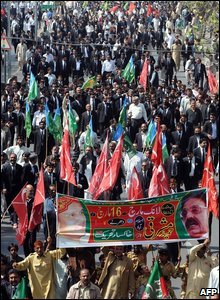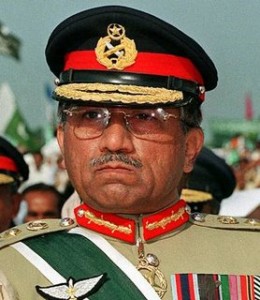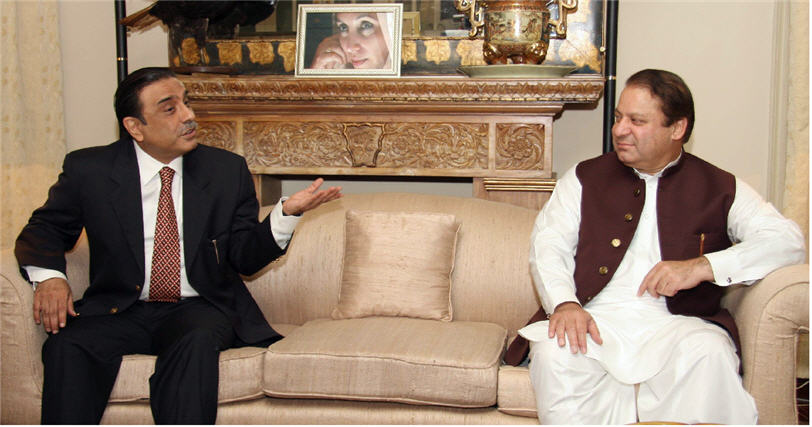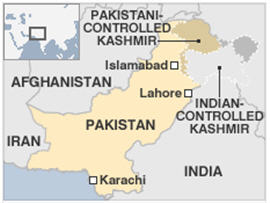 History repeated itself in Pakistan yesterday as thousands of lawyers from cities all over the country mounted another “Long March,” which they hope will end on Monday with a sit-in at the parliament in the capital, Islamabad. And, like last year, the clarion call this year is for the president to reinstate all judges sacked by his predecessor.
History repeated itself in Pakistan yesterday as thousands of lawyers from cities all over the country mounted another “Long March,” which they hope will end on Monday with a sit-in at the parliament in the capital, Islamabad. And, like last year, the clarion call this year is for the president to reinstate all judges sacked by his predecessor.
They can only hope because, like last year, Pakistani police will do everything possible to foil their mission. And no one doubts that if the police cannot maintain law and order this weekend, then the military will.
Of course it might surprise some to learn that the president being called on this year is Benazir Bhutto’s widower, Asif Ali Zardari. After all, he and the organizing figure behind this year’s march, Nawaz Sharif, were in the vanguard of those leading last year’s march to call on President Pervez Musharraf to reinstate these judges.
Frankly, what is going on in Pakistan is very troubling and could affect us all. But since I’ve been chronicling developments there for years, I shall suffice to publish a series of excerpts from previous commentaries that puts this latest episode into context:
 Pakistan’s Supreme Court, headed by Chief Justice Iftikhar Muhammad Chaudhry, issued a ruling which could only be regarded as an untenable challenge to the authority of General Pervez Musharraf… It’s hardly surprising that Musharraf wasted no time arresting, or putting under house arrest, all judicial and political opponents who he suspects might be inclined to oppose his declaration of emergency.
Pakistan’s Supreme Court, headed by Chief Justice Iftikhar Muhammad Chaudhry, issued a ruling which could only be regarded as an untenable challenge to the authority of General Pervez Musharraf… It’s hardly surprising that Musharraf wasted no time arresting, or putting under house arrest, all judicial and political opponents who he suspects might be inclined to oppose his declaration of emergency.
[Crocodile tears in West as Musharraf imposes martial law, TIJ, November 5, 2007]
Thousands of lawyers mounted a “Long March” on the Pakistani Parliament yesterday to call on President Pervez Musharraf to reinstate the judges he arbitrarily arrested and sacked last year. They were equally adamant, however, in their calls for Musharraf to resign for trying to stack the courts to save his presidency.
[Calls for Musharraf to resign portend chaos for Pakistan, TIJ, June 10, 2008]
Less than a week after joining forces to compel President Musharraf to resign, Zardari and Sharif, the leaders of Pakistan’s ruling coalition, have vindicated the following cynical observation I made six months ago about their working relationship:
Just as it was with Sharif and the late Benazir Bhutto, Sharif and the new leader of the PPP [Bhutto’s widower Zardari] might find that the only politician they hate more than Musharraf is each other.
Accordingly, citing a “string of broken promises” by Zardari (especially his refusal to honor his promise to reinstate the judges Musharraf sacked), Sharif announced on Monday that he is withdrawing his support from the government… It did not take them long to disabuse Pakistanis of any hope that they would be able to work together to cure the country’s crippling economic woes and combat al-Qaeda’s increasingly violent insurgency.

Therefore, having rid the country of bogeyman Musharraf (who at least enforced some degree of stability), Zardari (left) and Sharif (right) now seem determined to plunge Pakistan into sectarian political warfare that will make the conflict between Sunni and Shia in Iraq seem like a schoolyard row.
 And this political warfare will not only raise questions about Pakistan as a responsible nuclear power but also compromise its ability to fight insurgent terrorists on the real front in the war on terror; i.e., on the border regions between Pakistan and Afghanistan.
And this political warfare will not only raise questions about Pakistan as a responsible nuclear power but also compromise its ability to fight insurgent terrorists on the real front in the war on terror; i.e., on the border regions between Pakistan and Afghanistan.
[Pakistan’s ruling coalition falls … duh, TIJ, August 28, 2008]
Meanwhile, despite all of the political permutations in the offing, nothing terrifies world leaders more than the nightmare scenario of the keys to Pakistan’s nuclear weapons being democratically-snatched from Musharraf’s secure and trustworthy hands by a Muslim zealot; i.e. like a Pakistani version of Iranian President Mahmoud Ahmadinejad….
[Day of reckoning for America’s most-favored dictator Musharraf, TIJ, August 24, 1007]
Enough said! God help them … and us.
Leave a Reply
You must be logged in to post a comment.